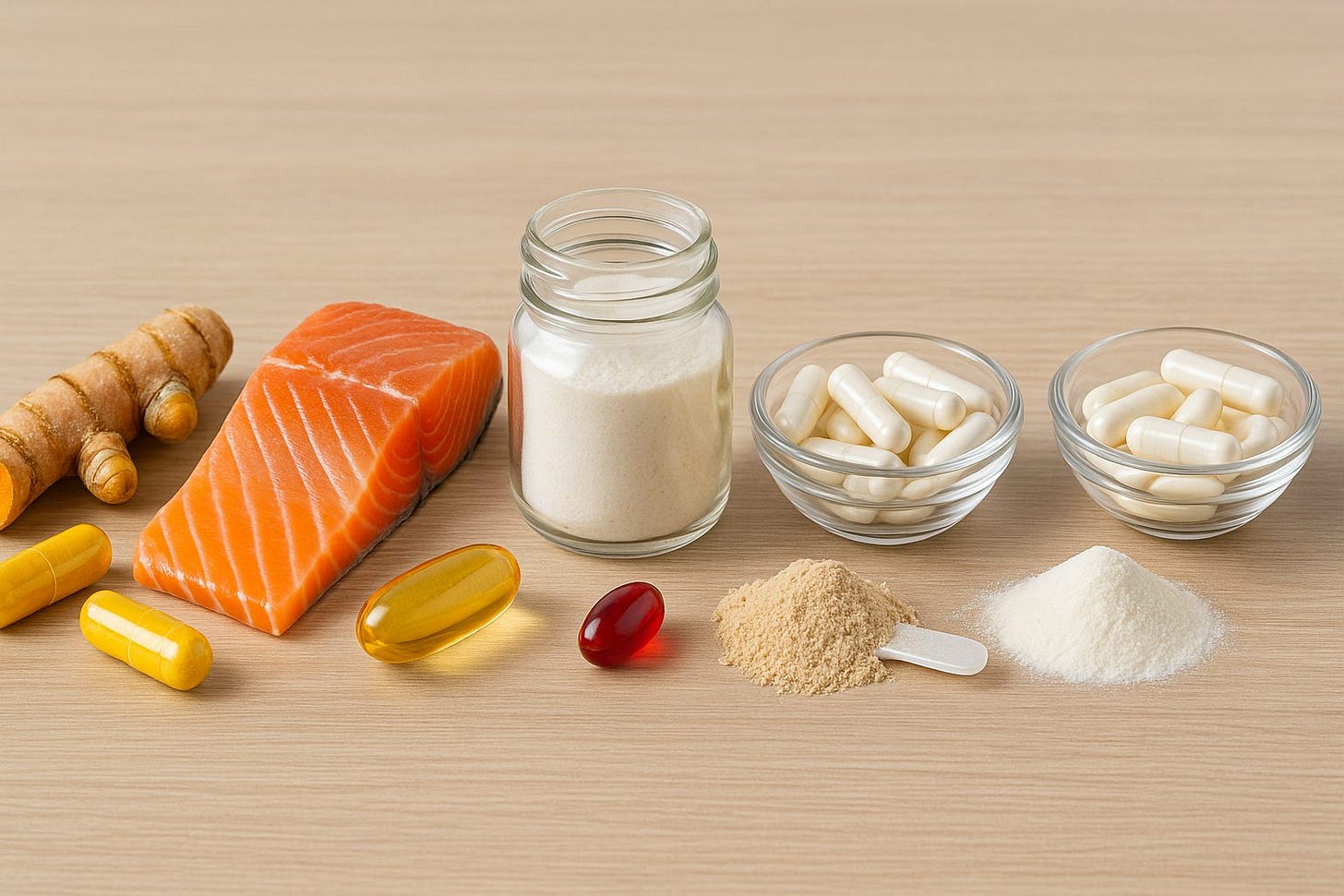The Top 7 Anti-Inflammatory Supplements That May Slow Down Aging
Harnessing nature’s healing secrets to power up your vitality—and maybe even turn back the clock.
Aging isn’t a roadblock—it’s a journey. But inflammation is that pothole that throws us off balance: creaky joints, fuzzy brain, tired everything. Enter anti-inflammatory supplements—nature’s toolkit armed with botanical warriors, nutrient heavyweights, and metabolic modulators designed to reduce inflammation at the source. I think some of these may actually dial down the cellular furnace that accelerates aging. Let’s explore.
1. Curcumin (from Turmeric)
You’ve probably seen turmeric lattes trending—and with good reason. Curcumin, the vibrant yellow compound, is a multi-pronged assassin. It suppresses NF‑κB, TNF‑α, IL‑1β, and COX‑2—those pesky inflammatory enzymes and cytokines—as shown in recent lab studies. It also helps shield skin cells from UV damage, according to a new review.
A 2025 meta‑analysis confirms curcumin’s ability to tame inflammation, boost memory, and support muscle health—exactly the kind of cellular boost we want with age. Dosage? Typically 500–1,000 mg daily, with black pepper or a fat source—that combo boosts absorption dramatically.
Curcumin might be the superstar, but it heavily leans on smart formulation to make it bioavailable.
2. Omega‑3 Fatty Acids (EPA/DHA)
Omega‑3s are the calm in the storm. They tone down pro-inflammatory gene expression in our blood, arteries, and brain. A landmark 3-year study examines folks 70+ who took 1 g/day of omega‑3s—they slowed biological aging by up to four months, with even better results when paired with vitamin D and exercise.
They’re also cholesterol-friendly, lowering triglycerides and heart risks—and cutting inflammation in conditions from arthritis to skin irritations. Vegan? Algal oil does the job with clean, plant-based DHA/EPA.
3. Resveratrol
The red‑wine legend isn’t just for cheers. Resveratrol is a polyphenol that activates SIRT1—often dubbed the “longevity gene”—and sculpts pathways to reduce oxidative stress and inflammation. On the skin, it revs up collagen and defends against UV insults.
Yes, the bioavailability isn’t stellar, and clinical results are mixed. But the preclinical evidence is layered: heart, brain, metabolism, and anti-aging. Think of it as a multi-talented backup: slower-burning but potent.
4. Astaxanthin
Meet the “king of carotenoids.” Astaxanthin is what gives salmon and flamingos their pink hue—and packs an anti-inflammatory punch by modulating NF‑κB, calming cytokines, boosting mitochondrial health, and preserving muscle mass.
It also enhances skin elasticity, hydration, and wrinkle reduction—making it a wearable anti-aging ally. Mitochondria love it. Muscles love it. Your glow will too.
5. Betaine
Here’s a sleeper hit: betaine (from beets and spinach) inhibits TBK1, a kinase that drives inflammation and cellular aging. In mice, it improved metabolism, cognition, organ health—and in humans, boosted anti-aging markers post-exercise.
Cheap, widely available, and promising—even if the data come from small groups. Great for those who’d like to complement physical training with cellular support.
6. Collagen Peptides
Collagen supplements aren’t strictly anti-inflammatory—but they rebuild structures that age breaks down. Studies show improvements in skin elasticity, hydration, fine lines, and joint comfort within 8–12 weeks of taking collagen peptides.
They supply amino acids needed for tissue repair—a structural foundation to offset inflammation-driven damage. Pair with vitamin C for synergy.
7. NAC & NAD⁺ Boosters (NMN, Niacinamide)
Glutathione precursor NAC is gaining buzz in skincare circles—topical or oral, it supports barrier repair and replenishes antioxidant defenses.
Meanwhile, NAD⁺ boosters like NMN and niacinamide fuel mitochondrial energy and DNA repair—key to reversing age-linked cellular burnout. Applied topically, NAD⁺ shows promise in rejuvenating skin health and texture.
⚖️ Weighing the Evidence
Animal and preclinical studies offer strong mechanistic grounding.
Human RCTs are growing—omega-3s and curcumin lead the pack. Resveratrol & astaxanthin have promise, though dosing/formulation is crucial.
Safety: Most have well-tolerated safety profiles—but always check for interactions and dosing, especially with bioavailable versions.
Quick Comparison Table
Supplement: Dose (Approx.) / Anti-Inflammatory Benefits / Key Aging Effects
Curcumin: 500–1,000 mg/day + pepper / Lowers NF‑κB, COX‑2, cytokines / Slows skin aging, boosts cognition
Omega‑3 EPA/DHA: ~1 g/day / Lowers pro-inflammatory genes / Slows biological aging, heart & brain support
Resveratrol: 100–500 mg/day / Activates SIRT1, antioxidant / Skin health, metabolic & cardiovascular effects
Astaxanthin: 4–12 mg/day / Blocks NF‑κB, boosts mitochondria / Skin tone, muscle, neuroprotection
Betaine: ~1 g/day / Inhibits TBK1 (inflammation) / Metabolism, kidney, cognition
Collagen Peptides: 10–20 g/day / Structural support / Skin elasticity, joint comfort
NAC / NAD⁺ Boosters: Varies; often 200–500 mg+ / Replenishes glutathione, NAD⁺ / Skin regeneration, cell repair
Also read: 6 Supplements That Might Actually Slow Aging (and 2 That Probably Don’t)
Tips for Smart Usage
Stack wisely: Curcumin + black pepper, collagen + vitamin C.
Think combos: Omega‑3 + vitamin D + exercise = synergistic slowdown of aging.
Formulation matters: Opt for phytosome curcumin, liposomal resveratrol, algal DHA/EPA.
Watch quality seals: NSF, USP, third-party testing.
Consult your doc: Especially if you’re on medication, pregnant, or managing chronic disease.
Final Thoughts
No single pill holds the elixir of youth—but these seven supplements offer evidence-based ways to reduce inflammation, support cell repair, and keep you glowing inside and out.
Start with one or two that resonate—maybe curcumin for brain and joints, omega‑3s for heart and systemic benefits—and layer in others as you tune into your body’s needs.
What’s your anti-aging play? Have you tried any of these? Share your experience—or ask me what to stack next. Let’s defy time, one smart choice at a time. 😉


